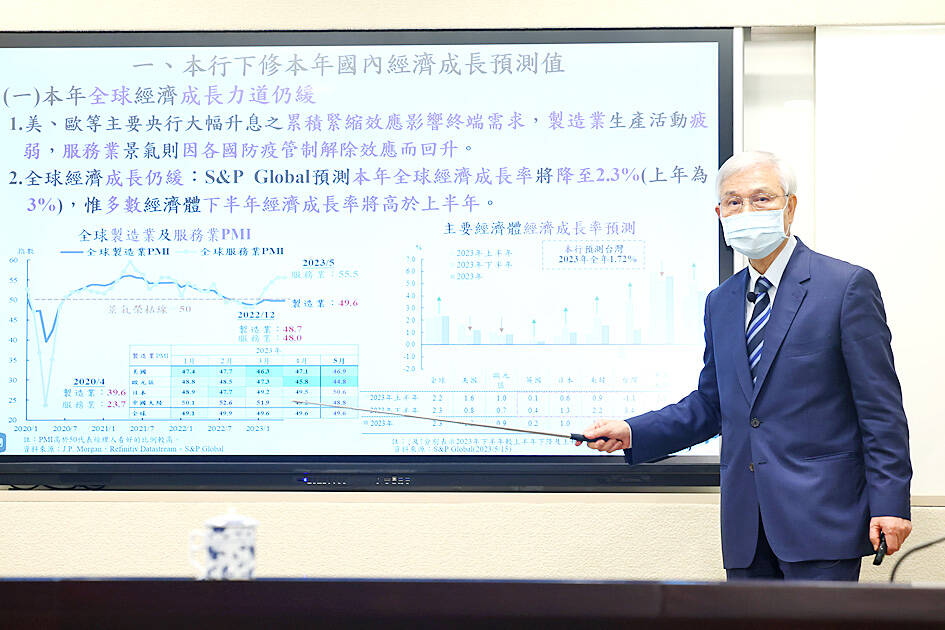The central bank yesterday kept its policy rates unchanged as it took cues from the US Federal Reserve’s announcement overnight, and tightened lending terms for second-home mortgages in some municipalities.
Taiwan’s central bank cut its GDP growth forecast for this year from 2.21 percent to 1.72 percent and raised its consumer price index (CPI) projection from 2.09 percent to 2.24 percent.
“Fighting inflation remains our top priority, but we think it is time to pause and see how previous rate hikes will affect inflation and the economy,” central bank Governor Yang Chin-long (楊金龍) told a news conference after the bank’s quarterly board meeting.

Photo: CNA
The discount rate would stay unchanged at 1.875 percent, the collateralized refinancing rate would stay at 2.25 percent and the unsecured lending would remain 4.125 percent, the bank added.
Yang said he cannot rule out resuming interest rate hikes if inflationary readings veer from the bank’s 2 percent target.
Entertainment and rent costs, as well as wage increases, have boosted the CPI and hindered efforts to reduce inflation, Yang said, adding that inflation driven by the service sector would persist until supply and demand reach an equilibrium.
That explains why central banks worldwide are more willing to live with high inflation and wait to achieve their 2 percent targets next year or in 2025, he said.
Economic weakness at home and abroad warrants the tempered approach, he added.
The central bank is more conservative than the Directorate-General of Budget, Accounting and Statistics (DGBAS) about Taiwan’s export and private investment outlook, and less upbeat about private consumption.
The statistics agency last month forecast GDP growth of 2.04 percent for this year.
The Fed said that a rate pause would give it more time to observe the cumulative and lagging effects of earlier interest rate hikes.
Taiwan’s central bank has raised rates by 75 basis points since March last year to curb inflation.
Last month, the CPI rose 2.02 percent from a year earlier, the slowest rise since July 2021, DGBAS data showed.
The central bank yesterday also lowered the loan-to-value (LTV) ratio for second-home mortgages from 75 percent to 70 percent in Taipei, New Taipei City, Taoyuan, Taichung, Tainan and Kaohsiung, as well as Hsinchu City and County.
The move came after house loans climbed to 37 percent of overall lending in April, from 36.83 percent in December last year, while the LTV ratios increased from 75.5 percent to 77 percent, warranting further selective credit controls, Yang said.
Hopefully, the move would help prevent capital from flowing to the real-estate sector, he said.

US President Donald Trump yesterday announced sweeping "reciprocal tariffs" on US trading partners, including a 32 percent tax on goods from Taiwan that is set to take effect on Wednesday. At a Rose Garden event, Trump declared a 10 percent baseline tax on imports from all countries, with the White House saying it would take effect on Saturday. Countries with larger trade surpluses with the US would face higher duties beginning on Wednesday, including Taiwan (32 percent), China (34 percent), Japan (24 percent), South Korea (25 percent), Vietnam (46 percent) and Thailand (36 percent). Canada and Mexico, the two largest US trading

AIR SUPPORT: The Ministry of National Defense thanked the US for the delivery, adding that it was an indicator of the White House’s commitment to the Taiwan Relations Act Deputy Minister of National Defense Po Horng-huei (柏鴻輝) and Representative to the US Alexander Yui on Friday attended a delivery ceremony for the first of Taiwan’s long-awaited 66 F-16C/D Block 70 jets at a Lockheed Martin Corp factory in Greenville, South Carolina. “We are so proud to be the global home of the F-16 and to support Taiwan’s air defense capabilities,” US Representative William Timmons wrote on X, alongside a photograph of Taiwanese and US officials at the event. The F-16C/D Block 70 jets Taiwan ordered have the same capabilities as aircraft that had been upgraded to F-16Vs. The batch of Lockheed Martin

GRIDLOCK: The National Fire Agency’s Special Search and Rescue team is on standby to travel to the countries to help out with the rescue effort A powerful earthquake rocked Myanmar and neighboring Thailand yesterday, killing at least three people in Bangkok and burying dozens when a high-rise building under construction collapsed. Footage shared on social media from Myanmar’s second-largest city showed widespread destruction, raising fears that many were trapped under the rubble or killed. The magnitude 7.7 earthquake, with an epicenter near Mandalay in Myanmar, struck at midday and was followed by a strong magnitude 6.4 aftershock. The extent of death, injury and destruction — especially in Myanmar, which is embroiled in a civil war and where information is tightly controlled at the best of times —

China's military today said it began joint army, navy and rocket force exercises around Taiwan to "serve as a stern warning and powerful deterrent against Taiwanese independence," calling President William Lai (賴清德) a "parasite." The exercises come after Lai called Beijing a "foreign hostile force" last month. More than 10 Chinese military ships approached close to Taiwan's 24 nautical mile (44.4km) contiguous zone this morning and Taiwan sent its own warships to respond, two senior Taiwanese officials said. Taiwan has not yet detected any live fire by the Chinese military so far, one of the officials said. The drills took place after US Secretary